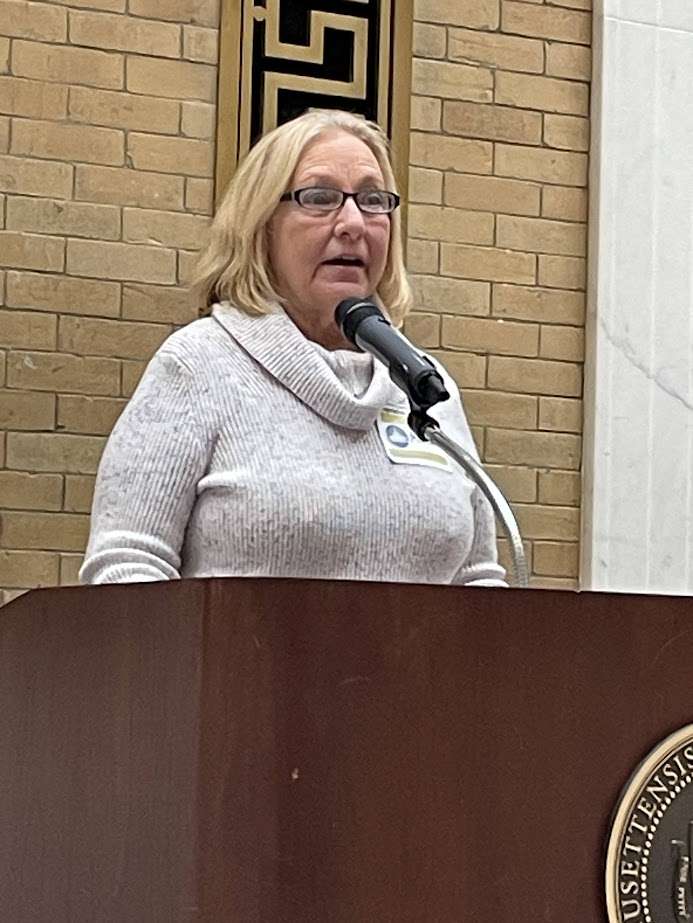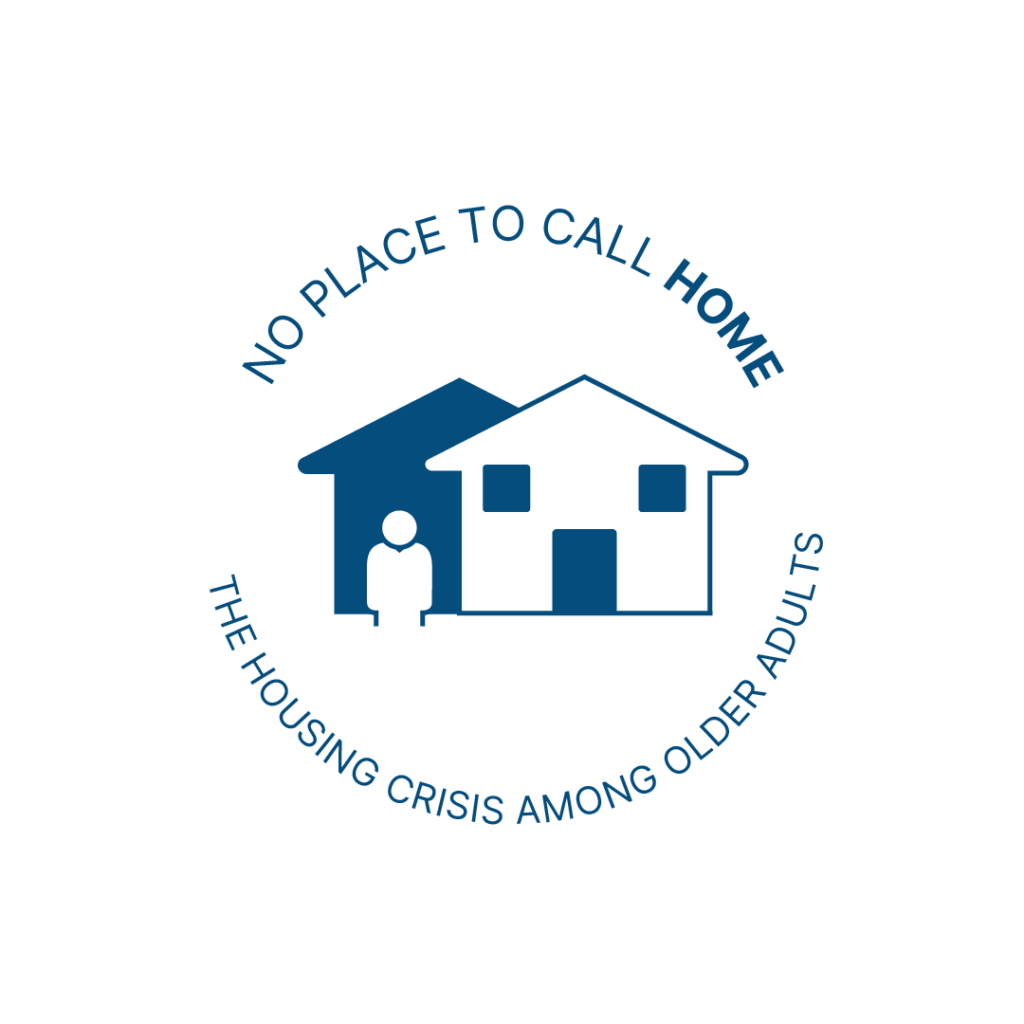Shoveling Sand Against the Ocean: Marian LeBlanc’s Struggle with Homelessness

When 71-year-old Marian LeBlanc stood at the podium at the Massachusetts Statehouse and told her story, she hoped it would reach people who could bring about change – for herself and the growing number of others like her. The former teacher and grandmother joined other AgeSpan clients at this year’s Massachusetts Coalition for the Homeless Legislative Action Day to describe how, after a lifetime of work and raising a family, she became homeless.
LeBlanc gained custody of her 11-year-old granddaughter and came out of retirement to work as a substitute teacher to support her. She moved back to Massachusetts from Florida in hopes of being closer to family and to create a stable home for her granddaughter. Instead, she found herself unable to afford one.
While living in a hotel through the state’s emergency housing program, she looked at apartments, visited housing authorities, put herself on waiting lists, and filled out paperwork, all while trying to work full time and take care of her granddaughter, who has special needs. Navigating the system, she says, has been emotionally and physically draining.
“I’m doing everything I can to find a more stable living situation, but it’s frustrating,” Marian says. “I’m lucky I have the energy to do it, because it’s exhausting, especially when it feels like I’m shoveling sand against the ocean. That’s what it feels like every day.”
Cost-Burdened Older Adult Households at an All-Time High
As a young widow, Marian put herself through school while raising three children. She was the first in her family to go to college, earned her master’s degree in special education, and had a career as a teacher. Now she earns $1,900 a month in Social Security income, joining a rising number of older adults who find their earnings in retirement don’t cover expenses. Households are considered cost-burdened if they spend 30 percent or more of household income on housing, utilities, taxes, and insurance. According to the Joint Center for Housing Studies of Harvard University, the number of older adult households that are cost burdened is at an all-time high.
“I’ve looked at so many different apartments. But they are so expensive,” she says. “Find me an apartment for $1,900 that will be suitable for me and my granddaughter, and I would gladly take it. But then I would have no money left. $1,900 is not 30% of my income, it is my income.”
Marian has applied for a Section 8 housing voucher, a federal subsidy that helps low-income individuals and families afford private-market rent. But like many in Massachusetts, she’s been stuck on waiting lists for years.
“I have called every elderly housing community that I could think of,” she says. “They all have a two, three or four-year wait list. Some can’t even tell you how long it will be.”
In recent years, Section 8 funding has not kept pace with the rising cost of housing in Massachusetts. The program and its recipients are facing uncertainty in the form of proposed cuts at the federal level and a pause on new applications at the state level. For Marian and other older adults across Massachusetts, these potential changes are making a difficult situation even harder.
“All of this taxpayer money that’s going into government. It’s from the people,” she says. “Shouldn’t it be for the people? Older people are suffering and it’s not fair because they’re the ones who have put a lot of money into the government.”
Grandparents Raising Grandchildren
Marian supplements her Social Security income with money she earns as a substitute teacher, but she is limited on how much she can work due to caring for her granddaughter.
“I can only work at my granddaughter’s school because of the hours,” she says. “I don’t have before school or after school care.”
It’s a situation that many others like Marian are in. The Massachusetts Commission on Grandparents Raising Grandparents estimates that there are more than 30,000 grandparents responsible for their grandchildren in the Commonwealth. An estimated 10,000 are doing so without the presence of either parent. Marian has tried to make the best out of her situation for the sake of her granddaughter and has reached out for support from programs such as the AgeSpan Family Caregiver Support Program, which offers support groups for grandparents raising grandchildren. Still, the emotional and financial stress of her situation has taken a toll.
“I want to live my life, but there’s so much instability, I can’t,” she says, tears welling in her eyes. “I mean, who wants to think you don’t have a place to live? That’s a human basic need. This situation has not been good for my mental health, or my overall health. It’s not good for my granddaughter to be worried about me.”
A Confusing System
With a deadline looming to leave the emergency shelter hotel, Marian found an apartment she could rent through the state’s HomeBASE program. This program helps families who have been found eligible for Emergency Assistance Family Shelter by providing rent payments up to $30,000 over a 2-year period. Marian hopes to stay in the HomeBASE program until she is approved for Section 8 housing. Even though she followed program requirements, there were delays and uncertainty right up until the last minute. Marian says the amount of paperwork she has filled out throughout this experience has been confusing and overwhelming – even for someone who has a master’s degree.
“There was nobody to help us. I was able to fill out the applications, but there are many people who don’t know the first thing about it and need help navigating the bureaucracy,” Marian says. “Then it goes back to, ‘it’s your fault,’ it’s my fault because of something I didn’t know.”
A 2022 report by The Boston Foundation found that state programs aimed at helping people find subsidized housing are difficult to navigate. It’s hard to get clear information, because it’s spread across many different sources. Residents of one community may not be aware of opportunities in a neighboring community. This is also true of the application process, which can vary from town to town, even development to development.
Among the legislative priorities of the Massachusetts Coalition for the Homeless is legislation that would make some changes to the HomeBASE program to make it easier for applicants. An Omnibus bill sponsored by Representative Marjorie Decker and Senator Adam Gomez would establish an ombudsman office to help applicants navigate the system and prohibit families from being turned away due to lack of documentation. Another bill, sponsored by Representative Christine Barber and Senator Liz Miranda, strengthens HomeBASE by making it a permanent program. The bill would allow applicants to get help before losing their housing, extend rental assistance to those who still need it beyond the current two-year timeframe, and raise the benefit to up to $50,000 over two years.
Housing Insecurity Can Affect Anyone
For a mother and grandmother who worked her whole life, holds an advanced degree, and paid taxes into the system for decades, for Marian to find herself facing housing insecurity at this stage is discouraging.
“People assume if you’re homeless, you must be on drugs or have done something wrong,” she says. “But I’m an American citizen who has worked hard my whole life. I paid taxes. I did everything I was supposed to do.”
Although she can feel defeated, she perseveres, holding on to hope that she can have what many take for granted.
“I want a home where we can thrive,” she says. “A place where I’m not worried every day, so I can go to work and keep my health and raise my granddaughter. Maybe even get some retirement, so I can rest.”

This is the first in our series – No Place to Call Home: The growing problem of housing insecurity among older adults in Massachusetts.
Recent Posts
Categories
- Aging Unbound
- Annual Golf Classic
- Ask Joan – Weekly Q and A Column
- Caregiver Events and Workshops
- Caregivers Connect
- Caring for Someone with Alzheimer’s or Dementia
- Changing Aging
- Community
- COVID19
- Digital Access
- For Families and Caregivers
- General
- General Ideas and Support
- Geriatric Support Services
- Grandparents / Kinship Caregivers as Parents
- Health Worker
- Healthy Aging
- Inspiring Aging
- LGBTQ+
- Long Distance Caregiving
- Making Connections
- Medicare Resources
- New to Caregiving
- Nutrition
- PCA
- Program Update
- Resources
- Scam Alert
- Self Care for the Caregiver
- Uncategorized
- Veterans
- Volunteering
- What’s New Out There
- Years of Service
Tags
Affordable housing agespan Alzheimer's awareness caregiver Caregiver Care caregivers Caregiver Support clutter Cognitive community Connection Dementia diabetes education General Caregiving golf golf classic Grandparents health healthy aging hiring Hoarding housing learning Long Distance Medicare meditation memory cafe Memory Loss mental health Music and Memory Nutrition older adults older americans month personal care report elder abuse Resources Self Care SHINE taichi tournament volunteer wellness Yoga
